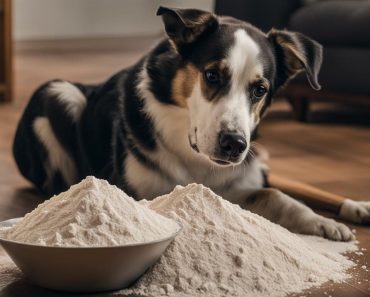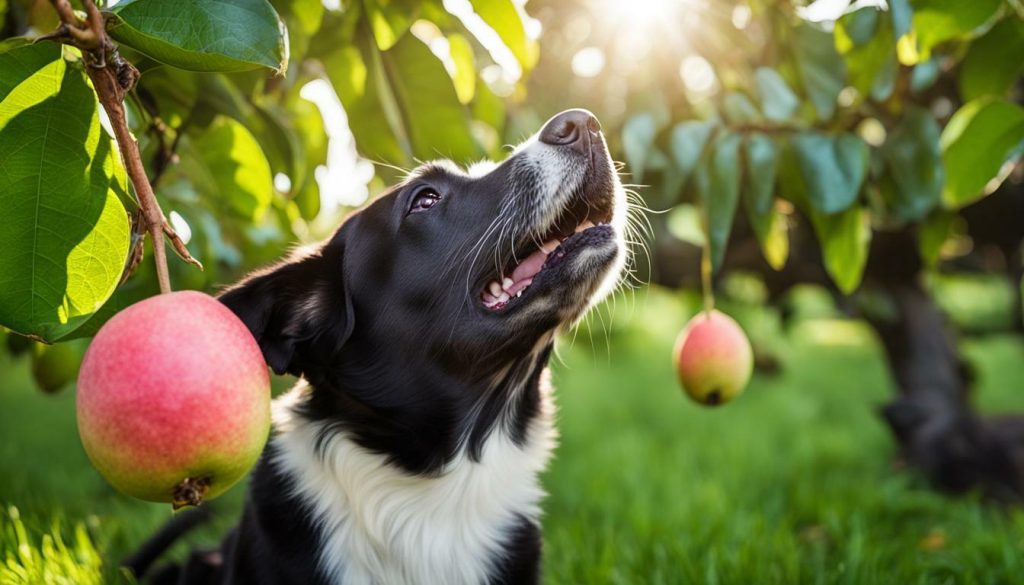
If you’re wondering if your furry friend can enjoy the deliciousness of guavas, you’re in the right place. Many dog owners are curious whether guavas are safe for dogs to consume. The good news is that guavas can be a healthy and tasty addition to your pet’s diet when given in moderation.
Key Takeaways:
- Guavas can be safely included in a dog’s diet but should be given in moderation.
- Remove the seeds before feeding guavas to dogs to prevent choking hazards.
- Feeding only the flesh of guavas is recommended, as the skin can be tough and fibrous.
- Guava leaves are not toxic to dogs, but excessive consumption can cause digestive issues.
- Guava paste should be fed sparingly due to its high sugar content.
- Always consult a veterinarian before introducing new foods to your dog’s diet.
- Other dog-friendly fruits include peaches, bananas, strawberries, watermelon, and blueberries.
The Nutritional Benefits of Guavas for Dogs
Guavas are more than just a tropical delight – they’re also a nutritious addition to your canine companion’s diet. Packed with vitamins, minerals, and antioxidants, guavas offer several health benefits for dogs.
Vitamin C is abundant in guavas, boosting your dog’s immune system and helping fight off infections and diseases. This vitamin also plays a crucial role in collagen production, promoting healthy skin and a shiny coat for your furry friend.
Furthermore, guavas are rich in dietary fiber, which aids in digestion and can prevent constipation in dogs. The high water content of this fruit can also help keep your dog well-hydrated, especially during warmer months.
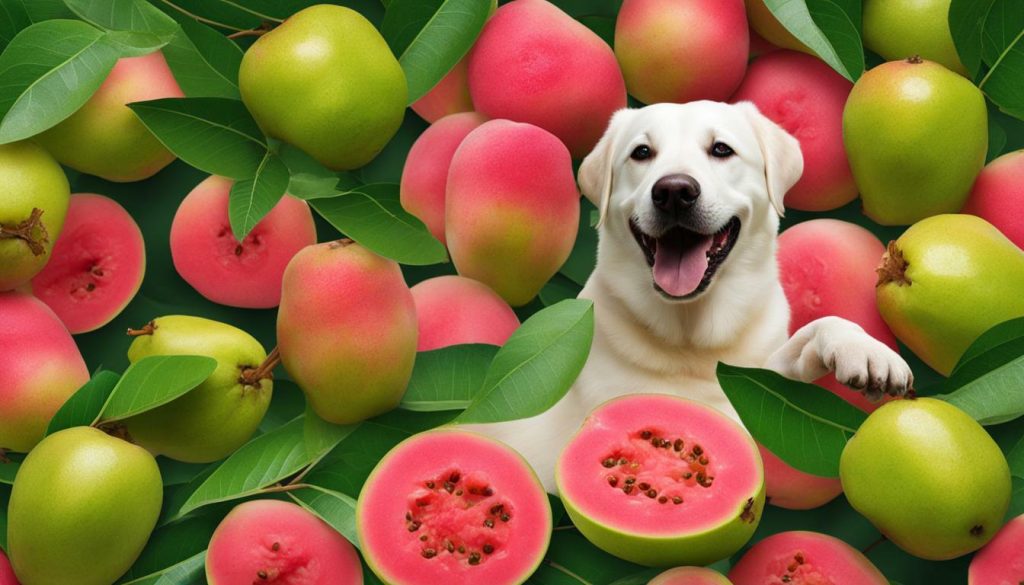
In addition to the vitamins and fiber, guavas are a great source of antioxidants such as lycopene and carotenoids. These antioxidants help reduce oxidative stress and inflammation in your dog’s body, promoting overall health and preventing chronic diseases.
Although guavas are a nutritious fruit for dogs, feeding them in moderation is crucial. Remove the seeds and offer only the flesh, as the seeds pose a choking hazard. Also, be mindful of any allergies your dog may have and introduce guavas gradually into their diet.
Summary:
- Guavas are a nutritious addition to a dog’s diet, providing vitamins, minerals, and antioxidants.
- Vitamin C in guavas boosts the immune system and promotes healthy skin and coat.
- The fiber content in guavas aids digestion and prevents constipation.
- Guavas are rich in antioxidants that reduce oxidative stress and inflammation.
- Feed guavas to dogs in moderation, remove seeds, and introduce them gradually.
| Nutrient | Amount in 100g of Guavas |
|---|---|
| Calories | 68 |
| Protein | 2.6g |
| Fat | 0.9g |
| Carbohydrates | 14.3g |
| Fiber | 5.4g |
| Vitamin C | 228.3mg |
| Vitamin A | 624IU |
Preparing Guavas for Your Dog’s Consumption
Before offering your dog a taste of guavas, taking a few precautions is essential to ensure they can safely enjoy this treat. Here are some guidelines to follow when preparing guavas for your furry friend:
- Wash the guavas thoroughly to remove any dirt or pesticides on the skin. This will help ensure that your dog ingests clean and safe fruit.
- Remove the seeds from the guavas before feeding them to your dog. Guava seeds can pose a choking hazard and should be carefully extracted. You can do this by cutting the guavas in half and scooping the seeds with a spoon.
- Cut the guavas into small, bite-sized pieces. This will make it easier for your dog to chew and digest the fruit. Remember to remove any remaining seeds that may be present in the flesh.
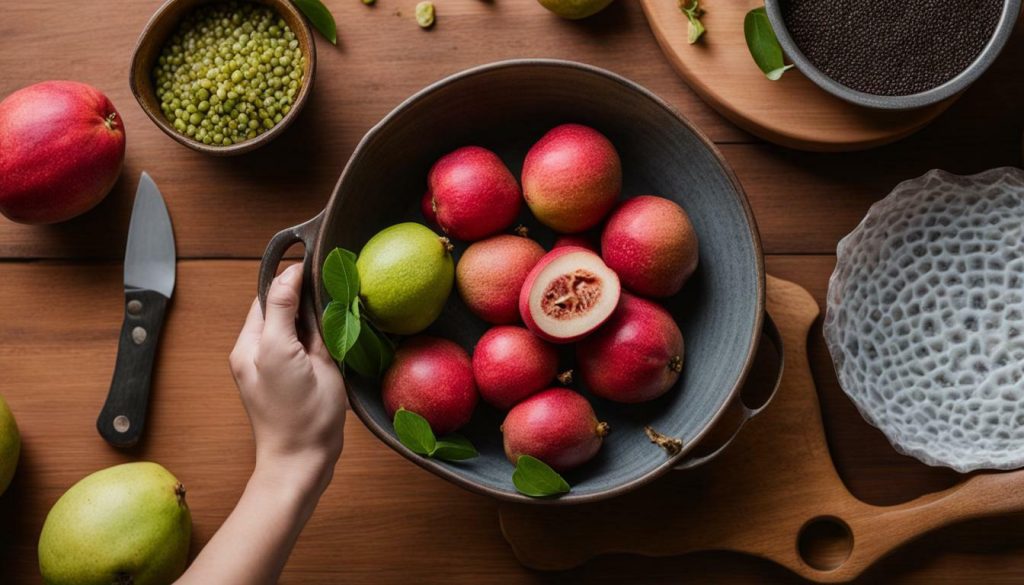
Following these simple steps ensures that guavas are a safe and enjoyable treat for your dog. Remember always to feed guavas to your pet in moderation, as excessive consumption of any fruit can cause digestive upset. It’s also a good idea to gradually introduce guavas into your dog’s diet to monitor for adverse reactions or allergies. As with any dietary changes, consulting with your veterinarian is recommended to ensure the best care for your furry friend.
| Benefits of Preparing Guavas for Dogs | Cautions |
|---|---|
|
|
The Importance of Removing Guava Seeds
When giving guavas to your furry friend, removing the seeds is crucial to prevent any potential choking hazards. Although guava seeds are small, they can pose a serious risk, especially for small or toy breeds. To ensure your dog’s safety, take the time to carefully remove the seeds before offering the fruit to them.
“I always advise dog owners to be cautious when introducing guavas to their pets,” says Dr. Amanda Smith, a renowned veterinarian.
“While guavas can be a great addition to a dog’s diet, the seeds can easily become lodged in their throat or digestive tract, leading to a medical emergency.”
By removing the seeds, you can enjoy feeding guavas to your dog without worrying about potential choking incidents.
To remove the seeds from guavas, cut the fruit in half and scoop out the seeds with a spoon or knife. Ensure that there are no remaining seeds before giving the guava flesh to your dog. Remember, safety should always be a top priority for your furry friend’s diet.
| Benefits of Removing Guava Seeds: |
|---|
| Prevents potential choking hazards |
| Reduces the risk of digestive issues |
| Maintains a safe and enjoyable eating experience |
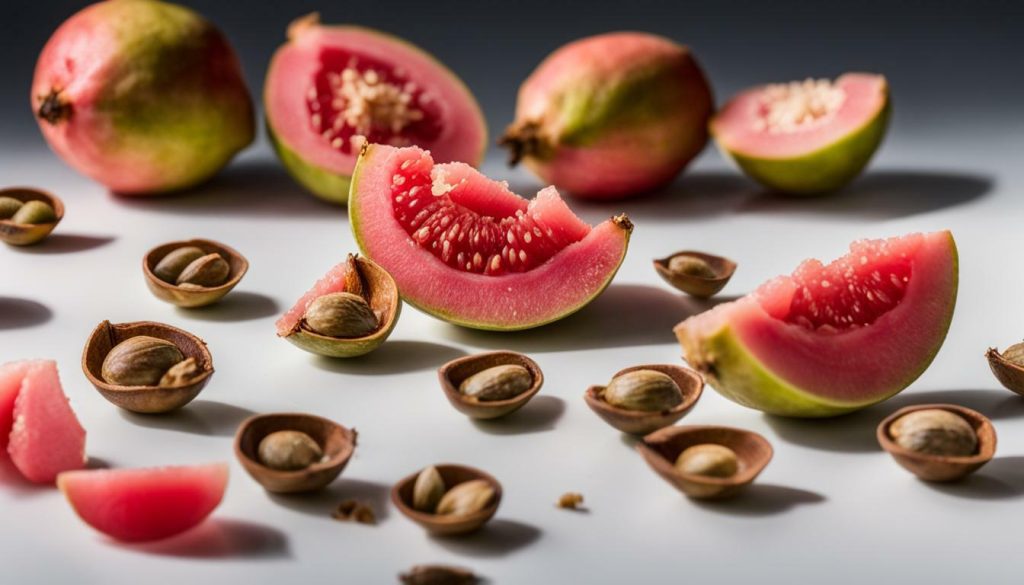
The Skin of Guavas and Its Impact on Dogs
While guavas offer numerous benefits for dogs, it’s best to stick to feeding them the flesh to avoid any potential digestive discomfort. The skin of guavas is tough and fibrous, which can be difficult for dogs to digest. Feeding dogs the skin of guavas may lead to gastrointestinal issues such as upset stomach, diarrhea, or even blockages. To ensure your furry friend enjoys guavas safely, always remove the skin before offering them this fruit. This way, you can reap the benefits of guavas without any worries.
Guavas can be served to dogs in small, bite-sized pieces. You can cut the guava into small cubes or mash it up to make it easier for them to consume. It’s important to remember that moderation is key when introducing new foods to your dog’s diet. While guavas are safe for dogs, they should be given in limited quantities and as part of a balanced diet.
As with any new food, monitoring your dog’s reaction to guavas is always recommended. If you notice any signs of discomfort, such as vomiting, diarrhea, or changes in behavior, it’s important to consult your veterinarian. They can provide specific guidance based on your dog’s needs and dietary requirements. Always prioritize your dog’s well-being and seek professional advice when necessary.
| Benefits of Guavas for Dogs | Precautions for Feeding Guavas to Dogs |
|---|---|
| • Packed with vitamins and minerals that support a healthy immune system • Antioxidants in guavas can promote a shiny coat and healthy skin • High fiber content aids in digestion and can help alleviate constipation |
• Always remove the seeds before feeding guavas to dogs to prevent choking hazards • Avoid feeding them the skin, as it can be tough and fibrous, potentially causing digestive issues • Guava paste should be given sparingly due to its high sugar content |
By following these guidelines and taking necessary precautions, you can safely introduce guavas into your dog’s diet. Remember to consult your veterinarian for personalized advice, and enjoy watching your furry companion savor the delicious and nutritious benefits of guavas.
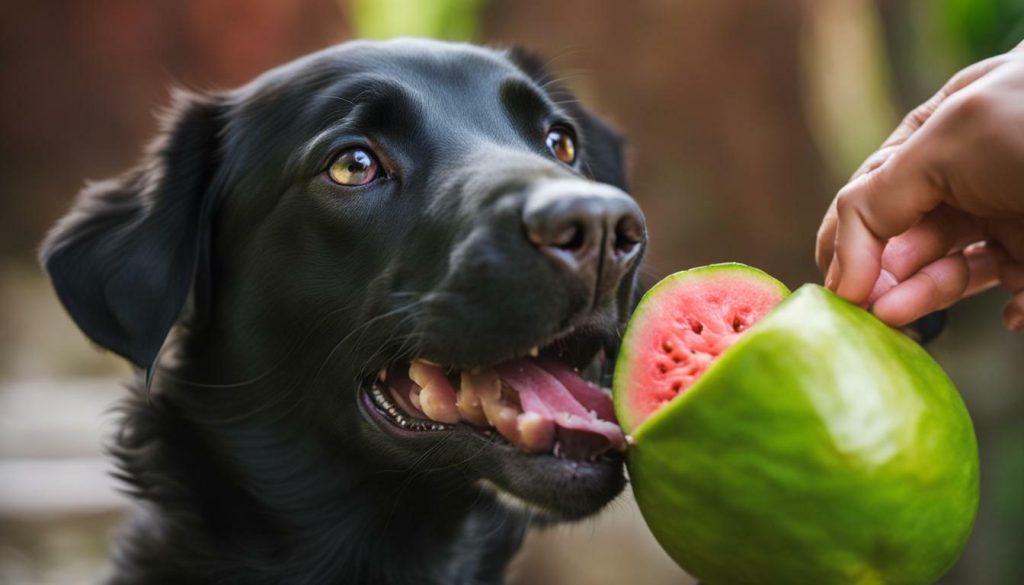
While guava leaves are not harmful to dogs, monitoring their intake is important, as excessive amounts can lead to digestive problems. Guava leaves contain a high amount of fiber, which can benefit a dog’s digestion when consumed in moderation. However, if a dog consumes too many guava leaves, it can cause gastrointestinal issues such as diarrhea or constipation.
Some dog owners may use guava leaves as a natural remedy for certain health conditions. The leaves are believed to have anti-inflammatory properties and may help manage digestive disorders. However, it’s important to consult with a veterinarian before using guava leaves for medicinal purposes, as they may interact with certain medications or have adverse effects on specific dog breeds.
When feeding guava leaves to dogs, it’s best to offer them in small quantities and observe how their digestive system responds. If there are any signs of discomfort or changes in bowel movements, it’s advisable to discontinue feeding guava leaves and consult a veterinarian.
Table: Potential Benefits and Risks of Guava Leaves for Dogs
| Potential Benefits | Risks |
|---|---|
| May aid digestion due to high fiber content | Excessive consumption can lead to digestive issues |
| Possible anti-inflammatory properties | May interact with medications or have adverse effects on specific dog breeds |
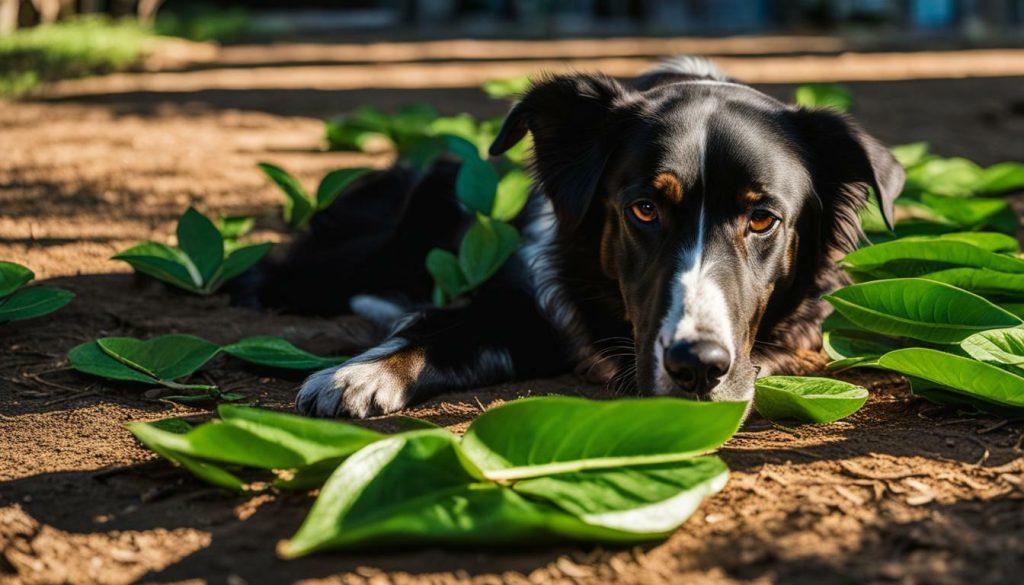
Guava leaves can be included as part of a balanced and varied diet for dogs. However, it’s crucial to introduce them gradually, monitor their effects, and consult with a veterinarian for guidance. As with any dietary changes, it is important to prioritize a dog’s health and well-being by ensuring they receive a balanced diet tailored to their specific needs.
Guava Paste and Its Considerations for Dog Consumption
Guava paste can be a tempting treat, but it’s essential to offer it to your furry friend in moderation due to its high sugar content. While dogs can enjoy the occasional taste of this delicious fruit paste, excessive consumption can lead to weight gain or dental issues. It’s important to remember that dogs have different nutritional needs than humans, and their bodies may not process sugar as efficiently as ours.
Feeding guava paste to your dog should be treated as a special treat rather than a regular part of their diet. Too much sugar can contribute to obesity, diabetes, and dental problems like tooth decay. It’s best to reserve guava paste as an occasional indulgence and opt for healthier, lower-sugar treats for your furry friend.
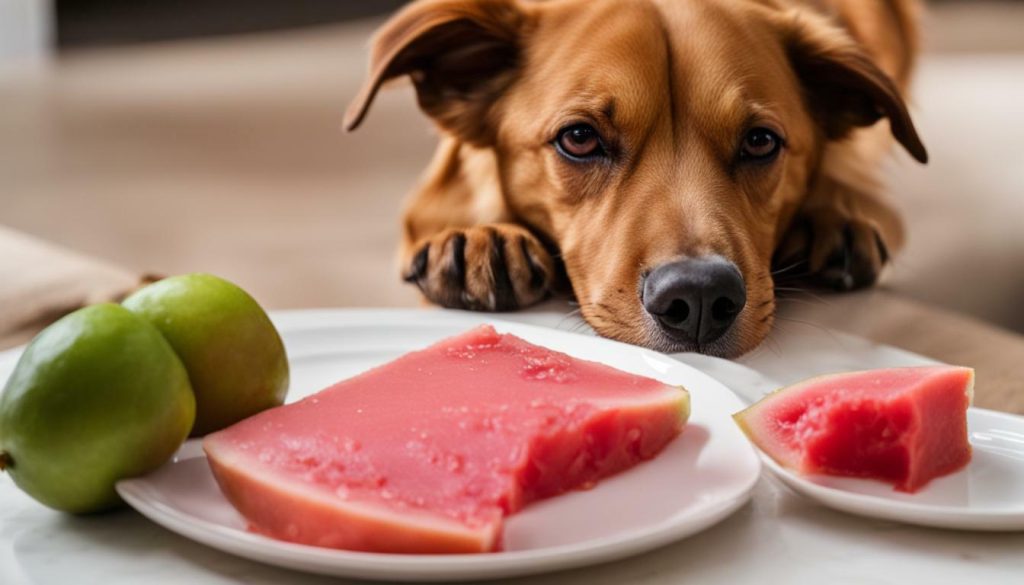
If you’re unsure about how much guava paste to offer your dog or if it suits their specific dietary needs, consult your veterinarian. They can provide personalized advice based on your dog’s age, weight, activity level, and overall health. Always read the ingredient list and check for any added sugars or artificial additives in the guava paste before giving it to your dog.
Consulting a Veterinarian for Dietary Changes
Before making any changes to your four-legged friend’s diet, it’s always a good idea to seek professional advice from your veterinarian. They can provide personalized guidance based on your dog’s needs and health conditions. While guavas can be a healthy addition to a dog’s diet, it’s essential to ensure they are given in moderation and prepared appropriately.
During your consultation, your veterinarian can help you determine the appropriate portion size of guavas for your dog’s size and breed. They can also advise you on properly cleaning and preparing the fruit to ensure that it is safe for consumption. Additionally, they can guide you on the importance of removing the seeds and feeding only the flesh to avoid any potential choking or digestive issues.
Furthermore, your veterinarian can help you assess if your dog has allergies or sensitivities that guavas or other fruits may trigger. They may recommend an elimination diet or allergy testing to identify potential food allergies or intolerances.
Remember that every dog is unique, and what works for one may not work for another. Consulting a veterinarian is crucial to ensure that your dietary changes align with your dog’s needs and overall well-being. By working closely with your veterinarian, you can provide your dog with a balanced and healthy diet that includes guavas and other suitable fruits.
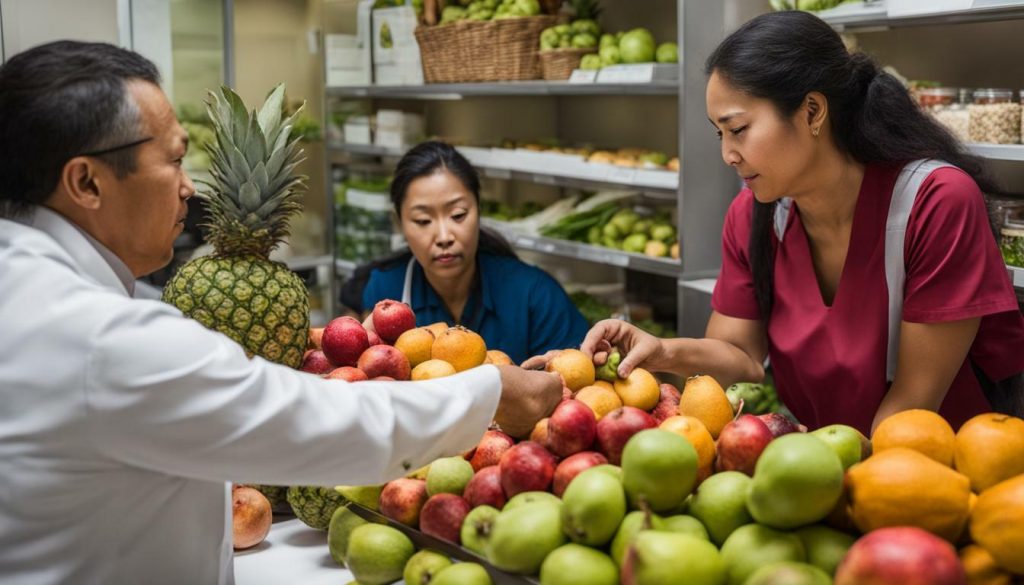
| Benefits of Consulting a Veterinarian for Dietary Changes |
|---|
| Personalized Guidance: Your veterinarian can provide tailored advice based on your dog’s needs and health conditions. |
| Portion Control: They can help you determine the appropriate portion size of guavas for your dog’s size and breed. |
| Safe Preparation: Your veterinarian can guide you on cleaning and preparing guavas to ensure their safety. |
| Allergy Assessment: They can assess if your dog has any allergies or sensitivities that guavas or other fruits may trigger. |
| Individualized Approach: Your vet can help you create a balanced and healthy diet plan that suits your dog’s needs and preferences. |
Other Dog-Friendly Fruits to Incorporate
In addition to guavas, a wide array of dog-friendly fruits can be a healthy and tasty addition to your pet’s diet. These fruits provide essential nutrients and can be a great source of hydration for your furry friend. Here are some dog-friendly fruits that you can safely incorporate into your dog’s diet:
- Apples: Rich in vitamins A and C and fiber, apples make a crunchy and nutritious treat for dogs. Be sure to remove the seeds and core before feeding.
- Oranges: Packed with vitamin C, oranges can support a dog’s immune system. However, only feed your dog the flesh of the orange and remove any seeds and the tough outer peel.
- Blueberries: These small berries are full of antioxidants that can benefit your dog’s health. They are also low in calories and can serve as a tasty training treat.
- Watermelon: A refreshing summer fruit, watermelon is hydrating and contains vitamins A and C. Remove the seeds and rind before feeding small pieces to your dog as a treat.
- Bananas: High in potassium, bananas can be a nutritious addition to your dog’s diet. They are also easy to digest and can be mashed or sliced for a tasty snack.
Remember to introduce new fruits gradually to your dog’s diet and monitor for any signs of digestive upset. While these fruits are generally safe, it’s always best to consult your veterinarian before making significant changes to your dog’s diet.
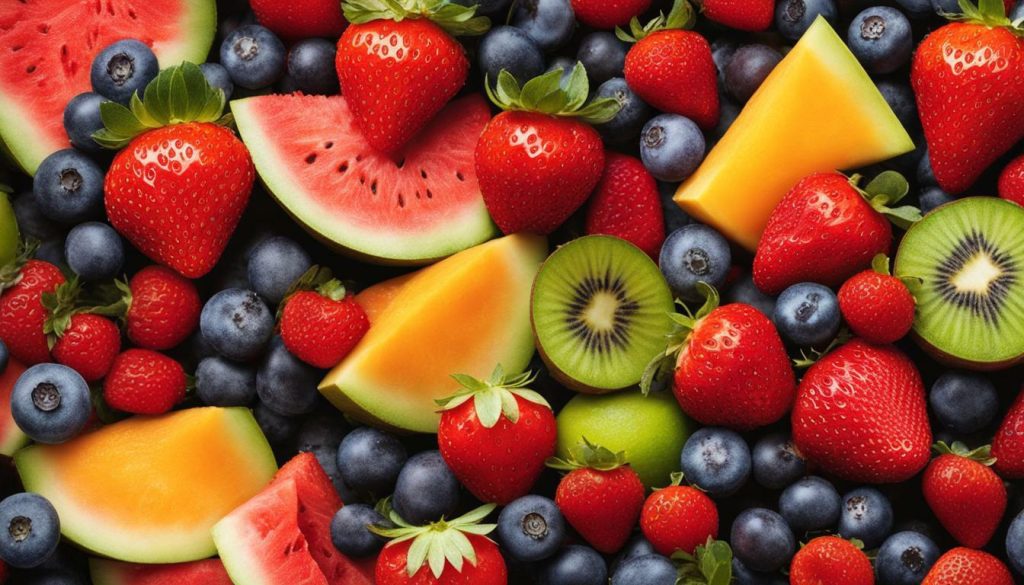
By incorporating a variety of dog-friendly fruits into your pet’s diet, you can provide them with a nutritious and flavorful eating experience. Just remember to offer fruits in moderation as a supplement to their regular balanced diet. With these tasty and healthy options, your furry companion will delightfully wag their tail!
Conclusion
In conclusion, guavas can be a delicious and nutritious dog treat if you take the necessary precautions and offer them in appropriate quantities. These tropical fruits are rich in vitamins, minerals, and antioxidants that can promote your dog’s overall health.
When feeding guavas to your furry friend, removing the seeds is essential to avoid the risk of choking. Additionally, providing the fruit’s flesh is best, as the skin can be tough and fibrous, potentially causing digestive issues.
While guava leaves are not toxic to dogs, excessive consumption may lead to digestive problems due to their high fiber content. It’s important to moderate your dog’s intake of guava leaves.
Guava paste, although tempting, should be fed sparingly due to its high sugar content. Feeding dogs excessive guava paste can contribute to weight gain and dental issues.
As with any dietary changes, it’s always advisable to consult a veterinarian before introducing guavas or any other new foods into your dog’s diet. They can provide personalized advice based on your dog’s specific nutritional needs.
Remember, guavas are not the only fruit that dogs can safely enjoy. Other dog-friendly fruits, such as peaches, bananas, strawberries, watermelon, and blueberries, offer a variety of health benefits. However, avoiding grapes and raisins is important, as they can be toxic to dogs.
When offering fruits or other human food to your furry friend, it’s best to provide them in their natural state and moderation. Your dog’s diet should primarily consist of balanced and high-quality dog food to ensure they receive all the necessary nutrients.
FAQ
Can dogs safely eat guavas?
Yes, dogs can safely eat guavas in moderation.
What are the nutritional benefits of guavas for dogs?
Guavas are packed with vitamins, minerals, and antioxidants that can benefit a dog’s immune system, skin, coat, and digestion.
Do I need to remove the seeds before feeding guavas to my dog?
Yes, it’s important to remove the seeds before feeding guavas to dogs due to the choking hazard.
Can dogs eat the skin of guavas?
It’s best to stick to feeding dogs the flesh of guavas to avoid digestive issues, as the skin can be tough and fibrous.
Are guava leaves toxic to dogs?
Guava leaves are not toxic, but their high fiber content can cause digestive problems if consumed in large quantities.
Can dogs eat guava paste?
Guava paste should be fed sparingly due to its high sugar content.
Should I consult a veterinarian before giving guavas to my dog?
It’s always advisable to consult a veterinarian before introducing new foods to a dog’s diet.
What other fruits are safe for dogs to eat?
Other safe fruits for dogs include peaches, bananas, strawberries, watermelon, and blueberries. Grapes and raisins should be avoided.
How should I offer fruits to my dog?
It’s best to offer fruits or other human food to dogs in their natural state and in moderation.





